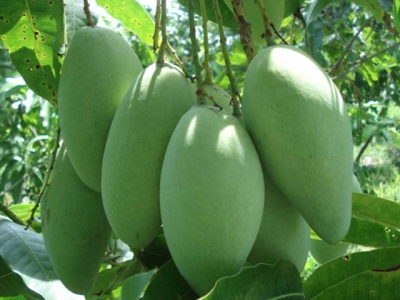Vietnamese fruits and vegetables have enormous potential for export to the United States.

Exports of Vietnamese fruits and vegetables to the United States have increased significantly in recent years, and Vietnamese products are seizing further chances to expand their presence in the major market.
Mango is one of six Vietnamese fruits that have been licensed to export to the US.
The United States is the world's largest importer of fruits and vegetables, with a massive value. According to the Vietnam Trade Office in the United States, despite the effect of the Covid-19 pandemic, Vietnam imported up to USD 14.1 billion worth of fruits in 2020, higher than that of 2019. In 2021, the US economy is definitely rebounding, thanks to pandemic containment and the biggest economic stimulus package in history, and consumer expenditure on food is rising.
According to statistics released on June 24, the US GDP increased by 6.4 percent in Q1 (compared to the average pace of 3% before the epidemic). With this increasing tendency, the US Department of Agriculture predicts that fruit imports will exceed USD 15.1 billion this year.
Vietnam has previously been given formal approval to export six different kinds of fresh fruits to the United States, including mango, longan, lychee, dragonfruit, rambutan, and star apple. While other fruits are shipped to the United States frozen or processed (packaged or dried). Vietnam's government offices are hastily negotiating with the US side to allow for the entry of more fresh fruits, the first of which is the green skin pomelo.
Vietnam's fruit and vegetable exports to the United States have been steadily increasing in recent years. Vietnam's fruit and vegetable exports to the United States hit USD 82 million in the first five months of 2021, increasing 32.3 percent year on year. The United States is presently Vietnam's second-biggest market for fruits and vegetables, behind China.
However, Vietnamese fruits and vegetables continue to have a relatively small market share in the US' overall yearly import value. As a result, it continues to have a lot of room to grow in terms of exports and market share in this market.
According to the Vietnam Trade Office in the United States and growing import demand, a variety of additional factors may help boost Vietnamese fruit and vegetable exports to the United States. To begin, the distribution system in the United States has become more diverse, multi-level, multi-channel, and contemporary, allowing for a greater variety of consuming possibilities. Imported fruits are sold in the United States via major supermarket chains, independent food shops in commercial areas, restaurant chains, hotels, and internet sales channels.
The variety and openness of American culture ensure that customers are constantly exposed to new goods, creating possibilities for fruits and specialties from Vietnam's tropics. Along with the supply and demand issue, this may also explain why imported fruits account for up to two-thirds of the US market demand.
Another benefit for Vietnamese veggies and fruits is the Vietnamese community in the United States, which has over 3 million members, over 30,000 foreign students, and many Americans who have tried and enjoyed Vietnamese fruit specialties. Numerous Vietnamese-born entrepreneurs are always passionate about importing and marketing Vietnamese fruits in the United States.
Vietnamese exporters have extensive experience exporting to the United States and have always received the assistance and support of government agencies such as the Ministry of Industry and Trade, the Ministry of Agriculture and Rural Development, and local governments in negotiating market access, planning planting areas, establishing favorable conditions, assisting customers in connecting, and penetrating the market.
Related news
 Mekong Delta expands sustainable and high-standard rice plant production areas
Mekong Delta expands sustainable and high-standard rice plant production areas Producing high-standard, merit, and added value rice plant adapting to climate change based on promoting the strengths, mobilizing the most effective resources.
 Hung Yen longan, agricultural products overcome Covid-19
Hung Yen longan, agricultural products overcome Covid-19 Apart from China, the traditional partner, others such as the US, Australia, and Japan all highly regard the potential of Hung Yen longan
 Lao Cai - Developing agriculture with a sense of place
Lao Cai - Developing agriculture with a sense of place On July 17, Deputy Minister of MARD Phung Duc Tien led a working session with Lao Cai province on livestock production, seafoods